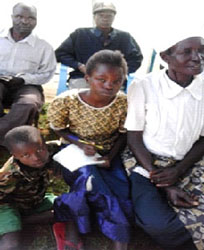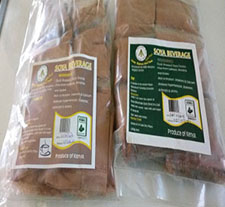Summary
Stimulating marketing and value-added processing of grain legumes is an important activity within the N2Africa Project in west Kenya. During the first six months of 2016 a total 96 tons of soyabean grain were sold through collective marketing by members belonging to the WeRATE R4D Platform in west Kenya, generating KES 5 million. This was a substantial improvement from the 36 tons sold over the same period in 2015 and does not include sales following the previous short rains or marketing by individual households belonging to WeRATE members. Furthermore, more WeRATE members subscribed to its factory processing services of branded soyabean products with more than 4,000 packets of roasted soyabean flour, 3,400 packets of dark roast soya beverage and 800 cups of soya yoghurt sold with net returns of nearly KES 220,000 in two months.
| Grassroots training continues among WeRATE members in legume marketing and processing, primarily focused upon youth and women interested in establishing income-generating enterprises. This training was conducted at existing One Stop Shops, which were previously established by N2Africa to provide last mile supply of BNF production technologies. Concerted networking and linkage efforts have earned the support of County Governments in west Kenya towards the development of the soyabean value chain by both WeRATE & other stakeholders in this region. |
Picture 1. Grass root training on legume marketing and processing. Note how a 10 year-old girl keenly takes notes for her grandmother |
Goals and objectives of Annapolis Wonder Enterprises (AWE) within WeRATE
Provide marketing support to the WeRATE R4D Platform and reinforce its marketing channels;
Assist in legume-based product design and packaging and support factory operations;
Support the WeRATE One Stop Shops in their technology dissemination and marketing activities;
Improve marketing and processing knowledge by conducting stakeholder workshops.
Activities and findings
Reinforce marketing channels. Enhanced links between soyabean producers of west Kenya and buyers, processors and brokers of the same led to the purchase of 96 metric tons of soyabean grain by seven buyers following production during the 2015-2016 short rains growing season (Table 1). During this period, soyabean production information on volumes and collation sites was gathered by AWE and N2Africa and shared with the soyabean buyers. Likewise, contact details of buyers, their preferred soyabean varieties, volumes required, preferred purchase time/months, buying price, preferred delivery and payment mode was gathered and passed to WeRATE members. Soyabeans were marketed in branded 50 kg bags distributed. Monitoring was conducted to document these transactions by WeRATE members (Table 2) and in some cases AWE provided assistance in price and delivery negotiations.
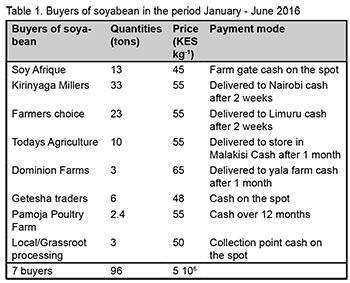 |
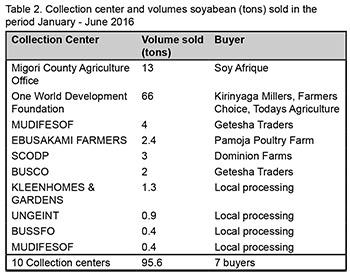 |
Knowledge gaps and stakeholder training. To reinforce grassroots capacities on legume marketing and processing, AWE first identified critical knowledge gaps through a baseline survey tool, mostly through stakeholder interviews. This survey tool is available upon request. The information collected was analyzed and summarized. The strengths, weaknesses, opportunities and threats to effective legume marketing and processing were highlighted and a basic training module developed and used to conduct grassroots training of over 200 participants. This training was conducted in May and June at eleven venues in west Kenya with facilitators drawn from AWE, KIRDI, and IITA.
An immediate benefit from this grassroots training was wider recognition of the WeRATE One Stop Shops that hosted this activity. It stimulated participants’ interest in soyabean production upon learning of the financial benefits of commercial production. This in turn increased the requirements for appropriate soyabean growing inputs sold through these One Stop Shops. Furthermore, there is increased farmer willingness to subscribe to the 2-TIER- FUNCTION, which is an additional opportunity for One Stop Shops to also act as aggregation points for legume harvest. The shops may then trade in these legumes either by selling grain or processed products.
Value added products. The processing of five value-added grain legume products at eight factories in west Kenya over two months is presented in Table 3. These products include fresh flavored-sweetened soyamilk, soya yoghurt in vanilla and strawberry flavors, Kinako soya flour and Dark Roasted Soya Beverage. These products result from several years’ development during N2Africa and in many cases are fully registered with Kenyan authorities and bear certification logos and bar codes.

| One of our goals in grassroots training is to promote similar processing at the more localized levels. Participants were educated on the significance of using properly processed legume products bearing the quality mark of assurance. This in turn has led to an increased demand for branded factory processed soya products among local consumers. As a result, the One Stop Shops have had to stock up on products such as Kinako, Soya Beverage and Soyamilk and its derivatives. The One Stop Shops have reported increased sale of these products in the months of May and June 2016. |
Picture 2. Soya Beverage is packed in 12 x 20 g economy-sachets that are sold for KES 15 per sachet |
Lessons Learned:
- Farmers in west Kenya have adopted crop rotation and grow pure stands of soyabeans during both the long and short rains growing seasons.
- Offered cash, soyabean farmers will sell their grain through established collection centers and as individual and local demand is rapidly growing.
- Grassroots training on legume marketing channels and processing stimulates product awareness and adoption among rural communities. This training has created a “pull effect” for factory-made soyabean products by consumers and stimulates their localized replication. More rural folks, especially women and youth, have engaged in enterprises involving the soyabean products, such as producing and selling soya drinks and soya-based snacks. This pull-effect provides an opportunity for the One Stop Shops operated by WeRATE partners.
- Increased awareness on the nutritional, health and financial benefits of soyabean has further catalyzed an interest in soyabean growing by the grass root rural communities of west Kenya.
- Buyers are less willing to engage soyabean farmers in contractual farming, because of fluctuations in world market prices of the same and uncertainty of farmers’ faithfulness to such contracts. Rather they prefer to purchase from reliable farmer groups on a post-harvest seasonal basis.
Way forward and recommendations
Reinforce collection centers. Because farmers readily deliver their soyabean grain to designated collection centers when assured of cash on delivery, it is prudent for these collection centers to be reinforced with the cash to pay the farmers for the deliveries made. In line with this, AWE will:
- Negotiate with the buyers to liaise with collection centers and provide the cash to pay farmers for the deliveries made;
- Advise collection centers to consider accessing commodity-financing- credit facilities from financial institutions.
Mobilize the grassroots consumer base. One Stop Shops operated by WeRATE partners should optimize the “pull effect” for its branded soyabean products created by grassroots training on legume marketing channels and processing conducted by AWE. These shops should stock up on these products and wholesale them to the vendors and retail them to the end users. These activities must comply with Kenyan regulations where farm inputs (pesticides) and human food may not be marketed in the same shop without partition. In some cases, WeRATE members have acquired adjacent shops for this purpose.
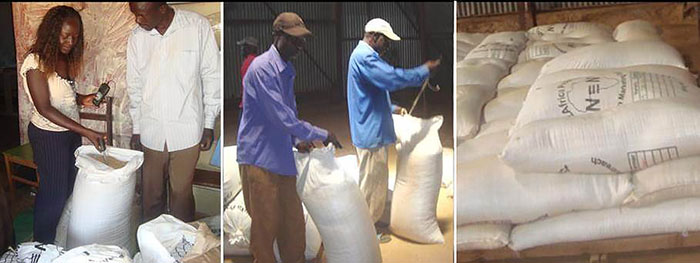
Picture 3. Soyabeans are logged into collection points, their moisture content verified (left), the bags stitched (center) and stacked onto pallets prior to sales (right) at a WeRATE market collection point. Note use of the N2Africa branded soyabean bags
Step up grass root trainings and awareness campaigns. This training and accompanying information campaign have successfully increased the demand and utilization of branded soyabean products by consumers in west Kenya, including farming households. This helps meet N2Africa’s objective of linking the protein needs of rural poor farmer households to the abundant atmospheric nitrogen, and increase their incomes through legume enterprises.
Josephine Ongoma, Annapolis Wonder Enterprises and Paul L. Woomer, Country Coordinator Kenya

